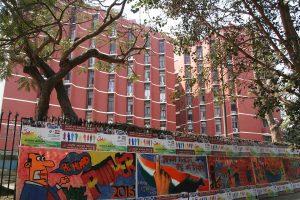When the Narendra Modi government issued an innocuous circular earlier this month directing senior bureaucrats of different ministries to “showcase/celebrate the achievements” of the ruling Bharatiya Janata Party (BJP) over the past nine years, it caused a huge uproar.
Opposition parties accused the government of “politicizing the bureaucracy” and using civil service officers to publicize the government’s achievements in the run-up to the crucial 2024 general elections. The Modi government is faced with the challenging task of retaining power for a third term amid growing criticism of its authoritarian tendencies.
The October 17-dated circular stipulated that joint secretaries, directors and deputy secretaries would be deputed to the 765 districts in the country as “Rath Prabharis” (chariot in charge) or Special Officers as part of the government’s grand publicity campaign “Viksit Bharat Sankalp Yatra” (Promise of a Developed India).
The two-month-long countrywide campaign that will deploy publicity raths (chariots) to highlight the Modi government’s achievements, will be flagged off on November 20.
Attacking the government for using senior bureaucrats for “political propaganda,” Congress leader Pawan Khera questioned how this could be done at a time when several states are in the midst of assembly elections. The Election Commission has announced elections in Rajasthan, Chhattisgarh, Madhya Pradesh, Telangana and Mizoram., and the Model Code of Conduct, which bars the use of any government machinery for political propaganda is already in force and will be in effect till December 5.
Appalled at the blatant politicizing of the proverbial “steel frame of India” i.e., its bureaucracy, former bureaucrats shot off letters to the Election Commission demanding that the directive be withdrawn.
Former Secretary to the Government of India E.A.S. Sarma wrote to Chief Election Commissioner Rajiv Kumar highlighting the “misuse of government machinery” to “influence elections” and urged the Election Commission to impose a deterrent penalty on the BJP-led central government. Sarma also drew attention to the fact that the government directive was in complete violation of Central and All India Civil Services (Conduct) Rules, which regulate the conduct of public servants. He underscored how the government’s directive to “coerce public servants” to influence electoral outcomes was a criminal offense under the Indian Penal Code.
On October 22, Congress President Mallikarjun Kharge who is also the leader of the opposition in the Rajya Sabha, India’s upper house of Parliament, wrote a strongly worded letter to the Prime Minister on behalf of the opposition INDIA bloc. Accusing the government of turning central government officers into “political workers of the ruling party,” he said that governance in the country would grind to a halt for the next six months while senior officers would be engaged in “marketing activity” for the government.
The defense ministry has also been roped in to promote government schemes. In his letter, Kharge highlighted a defense ministry circular dated October 9, which directed soldiers on annual leave to spend time promoting government schemes as “soldier ambassadors.”
It is of utmost importance that the armed forces are kept out of politics in a democracy, Kharge said, warning the government against “politicisation of the Armed Forces.” “Soldiers leave must not be hijacked for political purposes,” the Congress leader said.
Over the past nine years, the Modi government has aced the game of marketing and publicity and successfully swept all its failures under the carpet. In its bid for a third term, this time around it attempted to use bureaucrats for a publicity blitzkrieg, which has backfired.
Following the furor, the Election Commission belatedly swung into action to issue a notice that the government’s publicity campaign would not be permitted in the five election-bound states. Interestingly, hours ahead of the Election Commission notice, the government’s Information and Broadcasting Secretary Apurva Chandra said that since the Model Code of Conduct was already in effect, the Viksit Bharat Sankalp Yatra would be rolled out in the election-bound states only after assembly elections. Admitting that it was not appropriate to designate senior government officers as Rath Prabharis, Chandra said they will now be referred to as “nodal officers.”
The Modi government’s blatant disregard for constitutional propriety and norms has raised eyebrows.
While the Election Commission notice has temporarily put on hold the publicity campaign in poll-going states, it will be rolled out on schedule in the rest of the country. Therefore, the larger issue that needs to be addressed is the increasing politicization of the bureaucracy.
In an article in the news portal, The Wire, former Cabinet Secretary and Planning Commission member B.K. Chaturvedi said that the framers of the Constitution were clear that the “civil services were expected to be apolitical.” Referring to the concept of a committed bureaucracy, Chaturvedi argues that civil servants should only be committed to the constitution. While a bureaucrat frames policies with the approval of his/her ministers and helps implement the policies, the bureaucrat is not committed to the political ideology of his/her political master, he clarified.
More than one political analyst has observed that there are established mechanisms for publicizing government initiatives through the publicity department of the government. Its achievements are highlighted through the media and extolled by the political leaders/ ministers themselves. At best, the civil servant can explain the intricacies and workings of the scheme to people but cannot be expected to eulogize the government.
According to Chaturvedi, “Governments come and go but the civil servants remain a neutral observer.”
The Modi government’s attempts at blurring the lines demarcating the workings of the bureaucracy and the political leadership have unsurprisingly raised the hackles of the opposition. The latter see it as yet another attempt by the BJP to secure an unfair advantage in an electoral contest.
The BJP government has been utilizing central investigative agencies to intimidate political opponents and leaders in opposition-ruled states. In addition to these agencies acting as “election departments of the BJP,” now the entire government machinery has donned the role of “pracharak” or propagandists of the government, Kharge observes.

































